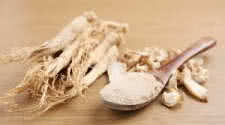Panax Ginseng Use in Bodybuilding - Effectiveness of Ginseng in Sports

Feed Your Muscles Properly for Ultimate Physique Results
A common nutritional question asked by athletes is in regards to the effectiveness of ginseng in the sports of bodybuilding? Is
it a worthwhile supplement to take or not? Let's take a closer look at ginseng.
It's certainly worth trying, then you can decide for yourself if it's worth taking long-term. Whether or not it actually helps
depends on who you ask. Some people swear by ginseng: others say it's a total waste. The truth probably lies somewhere between
those two points of view.
Panax ginseng is probably the form of the herb you're most familiar with - it's often referred to as Chinese, Korean or Asian
ginseng. Ginseng is known for its general revitalizing properties: supposedly, it can be used to "treat" fatigue, stress and
recovery from illness. Enough good research exists to validate its use, demonstrating that the millions of people who take it
aren't wasting their time and money.
Since the mid-20th century, much scientific research has been performed on various ginseng products and their active ingredient
known as ginsenosides. Panax ginseng has often been referred to as an adaptogen. In other words, it has the ability to help
normalize your physiology when you've been exposed to various types of stress. That's quite a claim, but is it true?
Some of the first studies on ginseng were performed in the late 1950's and early '60s by Russian and Bulgarian scientists, who
found that ginseng improved running speed as well as mental performance in soldiers. Long- term administration of ginseng to
newborn mice can apparently decrease the spread of tumors induced artificially via chemical carcinogens. Ginseng has been shown
to improve sexual function in both mice and humans. Also, in recent work from the University of Alberta, ginseng administration
(10 and 20 milligrams [mg]/kilogram per day) for four days improved aerobic endurance of rats (LC. Wang and T.F. Lee, "Effect
of ginseng saponins on exercise performance in non-trained rats,"Planta Medica, 64[2]:130-33, 1998).
However, ginseng doesn't always improve performance. Another study showed no ergogenic effect following a three-week
supplementation period of 200mg daily of Panax ginseng in healthy young adults. That dosage, though, is very low.
If you were to go by science, you'd have to say that ginseng improves exercise capacity sometimes, but not always. Perhaps the
best way for you to answer this question is to do a single-subject study on yourself. If you want to get "real scientific," blind
it so that you aren't aware if the pill you're taking is a vitamin or ginseng. Or you can just take the stuff for a prolonged
period of time; if it does anything or helps in any way, and you're in tune to your body, you should be able to tell.